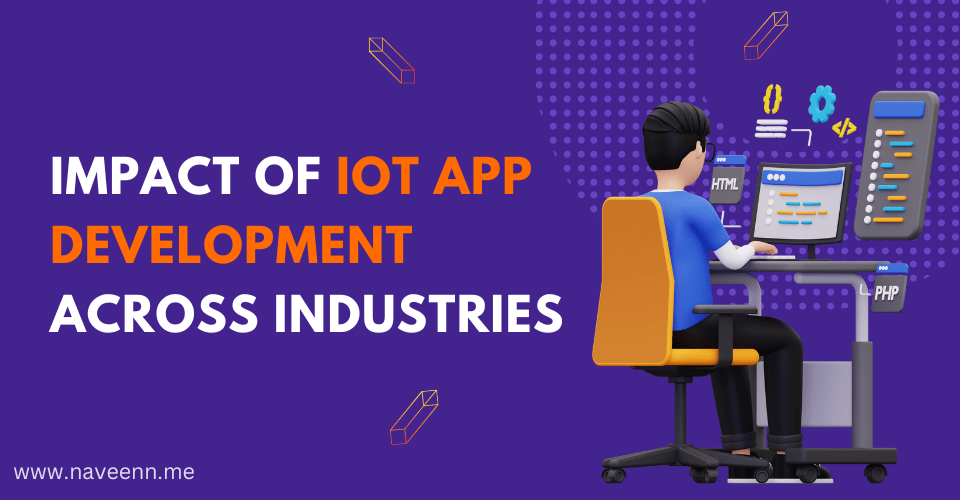In the realm of modern technology, the Internet of Things (IoT) stands as a beacon of innovation, reshaping the landscape of various industries. By seamlessly connecting devices, sensors, and networks, IoT app development has brought about a revolution, offering unprecedented efficiency, insights, and convenience across sectors. From healthcare to agriculture, manufacturing to retail, the impact of IoT applications is profound and far-reaching.
Revolutionizing Healthcare with IoT App Development
In the healthcare sector, IoT applications have emerged as a game-changer, revolutionizing patient care, monitoring, and treatment. IoT-enabled devices such as wearables, smart sensors, and connected medical equipment allow for real-time monitoring of patient vital signs, medication adherence, and disease progression. Remote patient monitoring systems enable healthcare providers to offer timely interventions and personalized care to patients, reducing hospital readmissions and enhancing overall patient outcomes. Additionally, IoT-powered telemedicine platforms facilitate virtual consultations, expanding access to healthcare services in remote areas.
- Remote Patient Monitoring: One of the most significant contributions of IoT app development to healthcare is remote patient monitoring. Traditionally, patients would need to visit healthcare facilities frequently for check-ups and monitoring, often leading to inconvenience and added stress, particularly for those with chronic conditions.
- Personalized Treatment Plans: IoT app development also facilitates the creation of personalized treatment plans tailored to individual patients’ needs. By integrating data from various sources, including wearables, electronic health records (EHRs), and patient-reported outcomes, healthcare providers can gain a comprehensive understanding of each patient’s health status, preferences, and lifestyle factors.
- Telemedicine and Virtual Consultations: The advent of IoT app development has also revolutionized the delivery of healthcare services through telemedicine and virtual consultations. IoT-powered telemedicine platforms enable patients to connect with healthcare providers remotely via video conferencing, messaging, or voice calls.
- Predictive Healthcare and Preventive Interventions: Another key aspect of IoT app development in healthcare is its role in predictive healthcare and preventive interventions. By leveraging IoT-enabled devices and predictive analytics, healthcare providers can identify individuals at high risk of developing certain conditions or experiencing adverse health events.
Read More: The Future of Mobile App Development
Enhancing Agriculture Efficiency by IoT App Development
In agriculture, IoT applications have ushered in the era of smart farming, optimizing resource utilization and crop management. IoT-enabled sensors embedded in soil, crops, and machinery gather data on soil moisture levels, temperature, humidity, and crop health. This data is then analyzed to provide insights into optimal planting times, irrigation schedules, and pest management strategies. Farmers can remotely monitor and control agricultural operations through mobile apps, increasing productivity, reducing water usage, and minimizing environmental impact.
- Precision Farming with IoT Sensors
- Remote Monitoring and Control
- Data-Driven Decision-Making
- Supply Chain Optimization
Streamlining Manufacturing Processes using IoT App Development
IoT app development has transformed the manufacturing industry by introducing the concept of Industry 4.0, characterized by interconnected smart factories and automated processes. IoT-enabled sensors and actuators embedded in machinery and production lines gather real-time data on equipment performance, energy consumption, and product quality. This data is leveraged to implement predictive maintenance strategies, minimizing downtime and optimizing production efficiency. IoT-powered supply chain management systems enable seamless tracking and tracing of raw materials and finished goods, enhancing inventory management and reducing operational costs.
- Real-Time Monitoring and Predictive Maintenance
- Optimizing Production Processes
- Supply Chain Management and Inventory Optimization
- Quality Control and Product Traceability
Revolutionizing Retail Experience Using IoT App Development
In the retail sector, IoT applications are reshaping the customer experience and optimizing operations across the entire supply chain. IoT-enabled devices such as beacons, RFID tags, and smart shelves facilitate inventory management, reducing stockouts and improving shelf visibility. Personalized shopping experiences are enabled through IoT-powered mobile apps and in-store navigation systems, offering tailored recommendations and promotions based on customer preferences and browsing history. Furthermore, IoT-enabled smart payment systems, such as contactless payments and mobile wallets, enhance transaction security and streamline the checkout process.
- Personalized Shopping Experiences
- Seamless Checkout and Payment
- Inventory Management and Shelf Visibility
- Enhanced Customer Engagement
Securing Smart Cities Using IoT App Development
IoT app development plays a crucial role in building smart and sustainable cities, addressing urban challenges such as traffic congestion, pollution, and public safety. IoT-powered traffic management systems utilize real-time data from sensors and cameras to optimize traffic flow, reduce congestion, and enhance road safety. Smart energy grids leverage IoT technology to monitor and manage electricity consumption, promoting energy efficiency and reducing carbon emissions. Moreover, IoT-enabled surveillance systems enhance public safety by providing real-time monitoring of public spaces and enabling timely response to emergencies.
- Surveillance and Monitoring
- Emergency Response and Disaster Management
- Infrastructure Protection and Resilience
- Privacy and Data Security
Conclusion
In conclusion, the impact of IoT app development across industries is profound and transformative, revolutionizing processes, enhancing efficiency, and improving the overall quality of life. From healthcare to agriculture, manufacturing to retail, IoT applications are driving innovation and reshaping business models. As the IoT ecosystem continues to evolve and expand, the possibilities for creating smarter, more connected, and sustainable solutions are limitless. Embracing IoT technology is not just a choice but a necessity for organizations seeking to thrive in the digital age.
